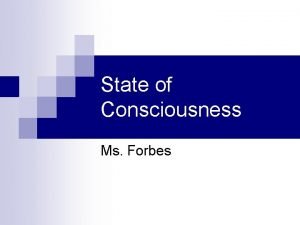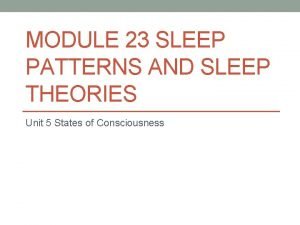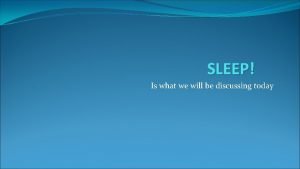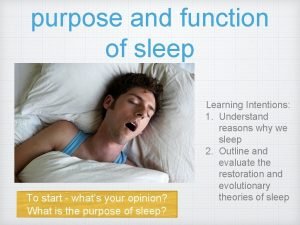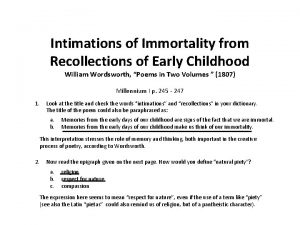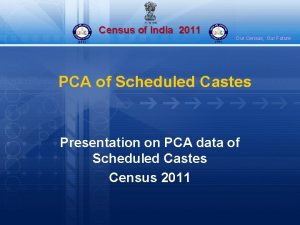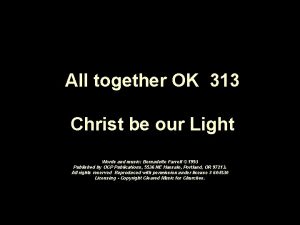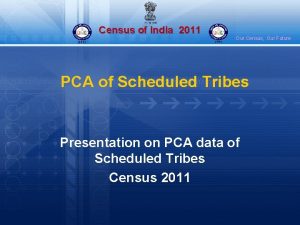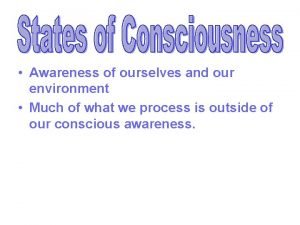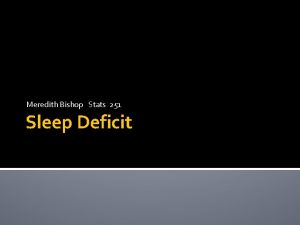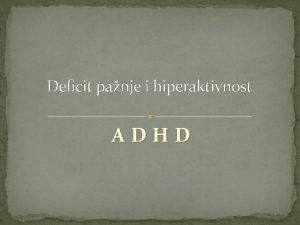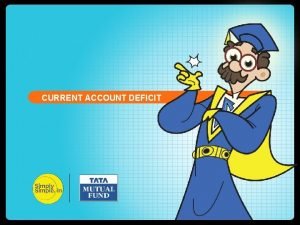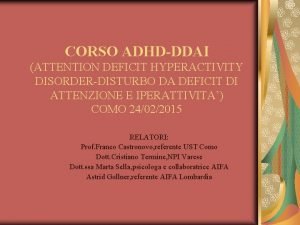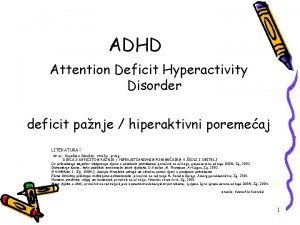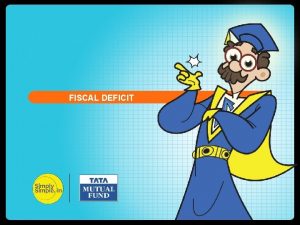Sleep Deficit Why We Sleep 13 of our

















- Slides: 17

Sleep Deficit

Why We Sleep • 1/3 of our lives we spend sleeping = 25 years! • Most people need 8 -9 hours of sleep to function • Americans sleep 7 -7. 5 hours. Almost 1/3 of Americans get less than 6 hours. • 74% women sleep less than 8 hours a night. • Most teens need 9 hours and 15 minutes of sleep a night. • Average teenager's biological clock doesn't prepare them to awaken until 8 or 9 AM. • This can interfere with memory and learning. Students with most sleep did better on grades and exams. • Getting less sleep than you need can cause harmful changes in metabolic and endocrine functioning. • After only one week of sleep restriction of 4 hours of sleep a night, subjects had glucose levels that were no longer normal. • When deprived of NREM or REM sleep, people will have NREM or REM rebound in which they spend more time in NREM or REM sleep in an effort "catch up. "


Sleep Deprivation Effects The Story of Randy Gardner – high school student who stayed awake for 11 days! • Hurts performance on simple, boring tasks more than challenging ones • After one night of sleep deprivation, people have episodes of sleep lasting a few seconds called microsleeps • See NBC Report on Sleeplessness in America (2 min) • See NBC Report on Sleep Study (3 min)

Sleep Deprivation (National Transportation Safety Board, 1995)

Coping with the Night Shift • Avoid frequent shift changes • Easier to lengthen your days than shorten them. – Progress morning to evening to night shifts. • If working at night use bright lights especially early on in the shift to adjust your circadian rhythm. • Take melatonin in the daytime to help you sleep & sleep in a dark room.

Sleep Deprivation Studies • Play “Catching Catnaps” (11: 45) – Episode 5 online – start at 35: 35 – Segment #13 from Scientific American Frontiers: Video Collection for Introductory Psychology (2 nd edition). • Which stages of sleep are most important? • Can a person survive on naps alone? • How does lack of sleep or “bonus” sleep affect mood?

Improving the Quality of Your Sleep • Don't drink or eat caffeine-containing drinks or foods. See table 4. 7 on pg. 175 for common sources of caffeine. • Don't go to bed very hungry or full • Moderate exercise during the day helps but not just before sleep. • Raise your core body temperature with a warm bath or shower. • Develop a consistent bedtime routine. • Relax & be in dim light • Don’t watch the clock/phone – hide it if you can’t help yourself • Avoid depressant drugs which promote sleep but reduce REM sleep. • Write down concerns and why you plan to do about them the next day or redirect your thoughts to something relaxing to deal with stress. • Add 15 minutes per night to your sleep to gain back lost sleep.


Individual Differences in Sleep Drive • Some individuals need more and some less than the typical 8 hours per night • Nonsomniacs—sleep far less than most, but do not feel tired during the day • Insomniacs—has a normal desire for sleep, but is unable to and feels tired during the day

Sleep Disorders Quick List • Insomnia—inability to fall asleep or stay asleep • REM sleep disorder—sleeper acts out his or her dreams • Night terrors—sudden arousal from sleep and intense fear accompanied by physiological reactions (e. g. , rapid heart rate, perspiration) that occur during slowwave sleep • Narcolepsy—overpowering urge to fall asleep that may occur while talking or standing up • Sleep apnea—failure to breathe when asleep • Parasomnias – any disorder involving movement in deep sleep stage 4.

Insomnia • Recurring problems falling asleep or staying asleep • Sleeping pills tend to inhibit or suppress REM sleep; worsen the problem • Alcohol suppresses REM sleep; also worsens the problem • Studies show most people overestimate how long it took them to get to sleep & underestimate how much actual sleep they’ve gotten

Sleep Apnea • A sleep disorder characterized by temporary cessations of breathing during sleep and consequent momentary reawakenings. • Tend to be loud snorers • Treated with a Continuous Positive Airway Pressure machine • See a clip of someone with it HERE

Narcolepsy • • • A sleep disorder characterized by uncontrollable sleep attacks Person goes directly into REM sleep Nervous system getting aroused tends to trigger the sleep attack May be caused by a lack of NT Orexin – linked to alertness Narcolepsy has a genetic link and runs in some breeds of dogs. • • • Rusty the Narcoleptic Dog Other Dogs with Narcolepsy Dobermans with Narcolepsy Skeeter the Narcoleptic Poodle Teenagers living with Narcolepsy

Somnambulism • Formal name for sleepwalking • Occurs in NREM-3 sleep • Person can walk or talk but remembers nothing of the experience • Lasts 2 -10 minutes • Occurs mostly in children • CNN Report on Sleep Deprivation & Sleep Walking (2 min)

Night Terrors • Sleep disorder characterized by high arousal and appearance of being terrified • Happens during NREM-3 sleep • Mostly occurs in children • Seldom remember the event.

Other Sleep Disorders • Bruxism – teeth grinding • Enuresis – bed wetting • Myoclonus – sudden jerk of a body part occurring during stage 1 sleep – Everyone has occasional episodes of myoclonus • Fatal Familial Insomnia – Stop sleeping then die! • Sleeping Beauty Syndrome - Ever feel like you could sleep for a week? This girl does! (5 min)
 Pictures
Pictures Dont ask
Dont ask Come sleep o sleep analysis
Come sleep o sleep analysis Adults spend about ______% of their sleep in rem sleep.
Adults spend about ______% of their sleep in rem sleep. Module 16 sleep patterns and sleep theories
Module 16 sleep patterns and sleep theories Module 23 sleep patterns and sleep theories
Module 23 sleep patterns and sleep theories Module 23 sleep patterns and sleep theories
Module 23 sleep patterns and sleep theories Intimations of immortality analysis
Intimations of immortality analysis Thinking language and intelligence
Thinking language and intelligence Our census our future
Our census our future Bernadette farrell christ, be our light
Bernadette farrell christ, be our light Our life is what our thoughts make it
Our life is what our thoughts make it We bow our hearts we bend our knees
We bow our hearts we bend our knees Our census our future
Our census our future Our life is what our thoughts make it
Our life is what our thoughts make it Money madness poem text
Money madness poem text Awareness of ourselves and our environment is
Awareness of ourselves and our environment is Our awareness of ourselves and our environment.
Our awareness of ourselves and our environment.



